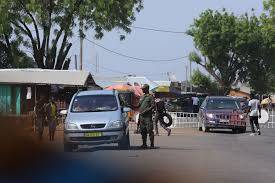Ghana's Northern Borders at Risk: Combating the Rising Threat of Cross-Border Extremism
Ghana, long considered a stable and peaceful nation in West Africa, is now grappling with escalating security concerns along its northern borders with Burkina Faso. The region has become a flashpoint for cross-border extremism, with groups like Jama'at Nasr al-Islam wal Muslimin (JNIM) actively exploiting local vulnerabilities. These extremist factions capitalize on existing socio-economic grievances and inter-communal conflicts, turning Ghanaian territories into critical transit points for arms, supplies, and recruits.
The increasing activity of extremist groups near Ghana's borders poses a significant threat to national security. Reports suggest that JNIM and similar organizations use Ghanaian routes to smuggle weapons and other logistics, leveraging porous border controls and insufficient surveillance. Such exploitation not only threatens the immediate safety of border communities but also risks destabilizing the entire nation if left unchecked.
Ghanaian authorities have ramped up counter-terrorism efforts, resulting in several arrests and disruption of some operations. However, these actions have yet to fully quell growing concerns. The fear of extremist activities spilling over into Ghana is compounded by the complex regional dynamics. Burkina Faso’s persistent insurgency and fragile governance create a fertile ground for these groups to thrive and expand their influence.
One of the most pressing challenges for Ghana is balancing proactive security measures with safeguarding the rights and livelihoods of its northern populations. Mismanagement or excessive force in counter-terrorism operations could alienate local communities, potentially driving disenfranchised individuals toward extremist ideologies. Collaborative and inclusive approaches are essential to mitigate this risk.
To address these security threats effectively, Ghana must prioritize the following:
1. **Enhanced Border Security**: Investment in technology, personnel, and infrastructure to monitor and control border activities.
2. **Regional Cooperation**: Strengthening partnerships with neighboring countries to share intelligence and coordinate counter-terrorism operations.
3. **Community Engagement**: Empowering border communities with economic opportunities and platforms to report suspicious activities without fear of reprisal.
4. **Strategic Communication**: Combating extremist narratives through education and promoting national unity.
Ghana stands at a critical juncture. By addressing these challenges holistically and proactively, the nation can safeguard its hard-earned peace and maintain its role as a beacon of stability in West Africa. Failure to act decisively, however, risks opening the door to a growing wave of insecurity that could reverberate across the region.



No comments yet
Be the first to share your thoughts!